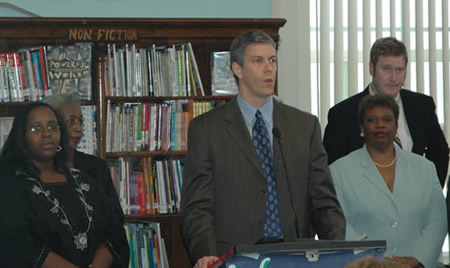Chicago Teachers Union leadership touts ‘merit pay’

Never asked approval of union’s members...
No sooner had the Chicago Teachers Union election ended than CTU President Marilyn Stewart joined school officials and the head of the principals' association to announce Chicago's first merit pay program. The program had been in the planning stages for months, but CTU members had not been informed about it.
The Chicago Board of Education and the leaders of the CTU announced the plan at a press conference at Lawndale Community Academy on the west side of Chicago.
In a May 22 press release entitled "CPS Announces First Cohort for 'R.E.A.L.' Program — TIF Grant Provides Money, Training through TAP", CPS said the following:
"Chicago Public Schools Chief Executive Officer Arne Duncan today announced the first 10 schools in the launch of the Recognizing Excellence in Academic Leadership (R.E.A.L.) program, a teacher-incentive program that targets high-need schools while providing in-school leadership opportunities for teachers and a whole-school approach to improvement.
"We want the whole school working together as a team to make improvements in classroom instruction and student achievement," said CPS Chief Executive Officer Arne Duncan. "But the teachers are at the forefront of this effort. They have been the driving force behind our dramatic improvements over the past decade, and this program gives us the chance to take our school system to the next level on the strength of our teachers."
The CPS press release added: "Chicago Teachers Union President Marilyn Stewart said she believes this type of teacher empowerment is central to the union's overall mission. 'We're excited about teachers being the driving force of this initiative. This is what education reform is all about.'"
According to the Board of Education's Communications Department, the R.E.A.L. program, funded in part by a $27.5 million Teacher Incentive Fund (TIF) grant from the U.S. Department of Education.

According to the materials put out by CPS, up to 40 schools - including charter schools — will participate in the program over four years.
Twenty schools were selected to participate in the program; 10 of those schools will implement the program during the 2007-2008 year, and the other ten will act as a control group in 2007-08 and then implement the program in 2008-2009. In spring 2009, the next 20 schools will be selected to implement the program in the following two years.
Schools eligible to participate in the program have at least 75 percent of their students receiving free or reduced-price lunch, and at least 75 percent of their faculty voted to participate. Schools also were evaluated on their need and readiness, with contributing criteria including: teacher qualifications, experience, and turnover; and student attendance and achievement.
The CPS information continued: "The R.E.A.L. program uses the Teacher Advancement Program (TAP) model that offers:
"* multiple career paths: TAP Lead Teachers can earn up to $15,000 extra a year; TAP Mentor Teachers can earn an additional $7,000 per year;
"* ongoing job-embedded professional development: at least 50 to 90 minutes of common planning time each week; instructional planning driven by student data, and clusters led by TAP Lead and Mentor teachers;
"* instructionally focused accountability using a rigorous, objective evaluation rubric and multiple evaluations each year by trained staff; and
"* additional compensation for all staff, based on program
implementation and student achievement.
"Teachers at the participating schools can earn additional compensation and will assume a larger role in shaping classroom instruction throughout the school. TAP emphasizes the importance of building strong instructional teams and getting teachers more involved in planning and professional-development decisions. Compensation will be determined primarily by value-added test-score gains over time and a thorough, objective evaluation of the teacher's instructional skills. Principals and all other staff at the schools also will be eligible for such compensation based on student-achievement gains.
"By the third year, schools should see a decrease in teacher turnover to 7.5 percent, and 12 percent increase in student achievement. The program is estimated to cost more than $40 million, with the bulk of that supplied by the $27.5 million Department of Education Grant, $4.2 million in foundation support and a district commitment of $8.4 million.
"Duncan also thanked the Chicago Principals and Administrators Association, the Chicago Teachers Union, The Chicago Public Education Fund, the Joyce Foundation, the Broad Foundation, U.S. Senators Barack Obama and Richard Durbin, the National Institute for Excellence in Teaching's Teacher Advancement Program, and the CPS DRIVE Award-winning teachers for their contributions to the school system's grant proposal."
The first R.E.A.L. schools in Chicago are:
Cameron Elementary School, 1234 N. Monticello Ave.
Gresham Elementary School, 8524 S. Green St.
Lawndale Community Academy, 3500 W. Douglas Blvd.
LEARN Charter School, 1132 S. Homan St.
McCorkle Elementary School, 4421 S. State St.
Multicultural Arts High School (Little Village campus), 3120 S. Kostner
Ave.
Sumner Academy, 4320 W. Fifth Ave.
Telpochcalli Elementary School, 2832 W. 24th Blvd.
Wells Preparatory School, 244 E. Pershing Rd.
Westcott Elementary School, 409 W. 409 W. 80th St.


